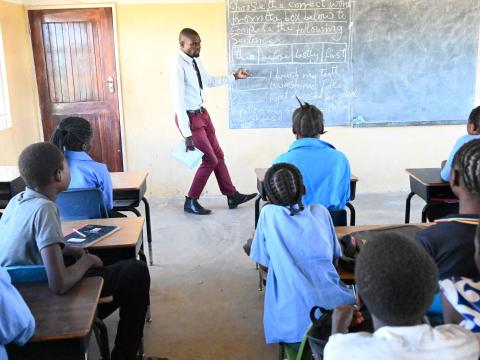From a Tree to a Classroom: How World Vision is giving children a chance for a better future through education in Sinanzongwe

Prior to 2018, the children of Maiya village in Zambia's Sinazongwe district had to trek six kilometres or more to reach the nearest school, which was too far for them. This challenge moved Givas Gwerere, a resident of Maiya village, to start a school and volunteer to teach the children.
"I felt so hurt whenever I saw children walking almost an hour to the nearest school," he said. "the distance deprived the youngest children as they could not walk the long distance. So I decided to start tutoring under a tree."
The community's support birthed a community school with 250 children learning under a tree.

The move was good but had its fair share of challenges, resulting in most children shunning the lessons.
While I was teaching, people would pass. Even animals would pass; cows, goats. It made the children’s concentration very low because they were distracted by what was happening outside”, says Givas.
The tree was a classroom for pre-schoolers and the Grade ones, who were learning together.
In addition to the long distance to school, another obstacle was that the Maiya village was situated near the Lake Kariba, which generated powerful winds that affected both learners and teachers, making it challenging for them to write. Furthermore, the school lacked desks, toilets, and running water, forcing everyone to walk to a nearby river to fetch water.
But that all changed when World Vision came in. The school now has a 1x3 classroom, which was started by the community and completed by World Vision.
World Vision also constructed toilets at the school and provided desks for the learners and chairs and tables for the teachers.
In addition, World Vision has put up a borehole within the school premises, where the learners and the surrounding community can now access clean and safe drinking water.
There is also a play park for the children, which has led to more children coming to school.

Givas is grateful to World Vision for changing the face of Maiya School.
“I am very grateful to World Vision because the school has grown. We started with 250 learners, and now we have 550. And we only had classes for preschool to Grade 2, but now we have gone up to Grade 6. World Vision also gave us a play park, encouraging more parents to bring their children to school. World Vision has made our work easy as teachers. We are more organised, and even the children can concentrate and write better. We thank World Vision for giving us hope. This investment has transformed this community. Our children will now have a better future. Thank you so much”, he says.
The learners are also happy about their new school.
16-year-old Unity, who is in Grade six, says the new classroom block has made learning easier.
The benefit of learning in a classroom like that is that even when it is windy or too sunny outside, we can learn without any disturbances or distractions. Even if it rains, we do not get soaked. We thank World Vision for building this classroom block and giving us clean water. Our education will continue because we are now learning in a good environment," she says.
And Hungest, also in Grade six, says he is grateful for the classroom block, the toilets, and the clean water.
“I want to thank World Vision for giving us a good environment to learn from, unlike in the past when we did not have somewhere to learn from and we did not have toilets and clean water. This time, we have very clean toilets and a good water source. Most of the children who were not going to school have started coming. This supports us, and we will continue learning until we finish school. Even other children will learn from this school in the future”, he says.
And Maiya village headman says he is grateful to World Vision for the clean water at the school, which also benefits 180 people in the surrounding community.
“We thank World Vision for giving us clean water. We used to suffer. We had to get water from the river, and animals like pigs and cows drank there too. They also put up a play park for the children. Whenever the children come to school, they play and are very happy. Many children are now coming to school. We thank World Vision and its supporters for bringing development to our village. God bless them”, he says.

As a result of the classroom block, the government has now allocated professional teachers to the school. In addition, the area programme trained people in reading awareness.
“Parents were trained in Reading Awareness Workshop to create reading corners to support their children’s learning. 8 Reading Camp Facilitators were also trained, and four reading camps were established to improve the reading levels”, says Sinazongwe Area Programme Manager Faustina Samboko,
She adds that the AP has built capacity in partners from different line ministries through the District Water Sanitation and Hygiene to ensure that Gender Equality and Social Inclusion are part of the development strategy to avoid leaving anyone behind.
World Vision has also built capacity in 163 teachers and is providing water to 13 schools out of 21 schools.